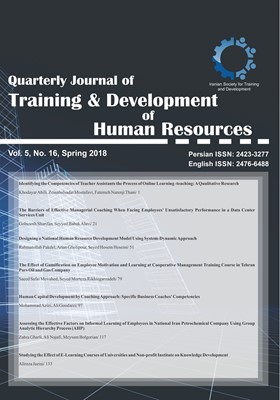-
-
List of Articles
-
Open Access Article
1 - Identifying the Competencies of Teacher Assistants the Process of Online Learning- teaching: A Qualitative Research
Khodayar Abili Zeinab Sadat Mostafavi Fatemeh Narenji thani -
Open Access Article
2 - The Barriers of Effective Managerial Coaching When Facing Employees' Unsatisfactory Performance in a Data Center Services Unit
Golnoosh Sharifan Seyyed Babak Alavi -
Open Access Article
3 - Designing a National Human Resource Development Model Using System-Dynamic Approach
Rahmatollah Pakdel Aryan gholipour Syed Hosain Hosseini -
Open Access Article
4 - The Effect of Gamification on Employee Motivation and Learning at Cooperative Management Training Course in Tehran Pars Oil and Gas Company
Saeed Safaei Movahed Seyed Morteza Rikhtegarzadeh -
Open Access Article
5 - Human Capital Development by Coaching Approach: Specific Business Coaches’ Competencies
Mohammad Azizi Ali Ghodarzi -
Open Access Article
6 - Assessing the Effective Factors on Informal Learning of Employees in National Iran Petrochemical Company Using Group Analytic Hierarchy Process (AHP)
Zahra Gharli Ali Najafi meysam bolgorian -
Open Access Article
7 - Studying the Effect of E-Learning Courses of Universities and Non-profit Institute on Knowledge Development
alireza jazini
-
The rights to this website are owned by the Raimag Press Management System.
Copyright © 2017-2026







